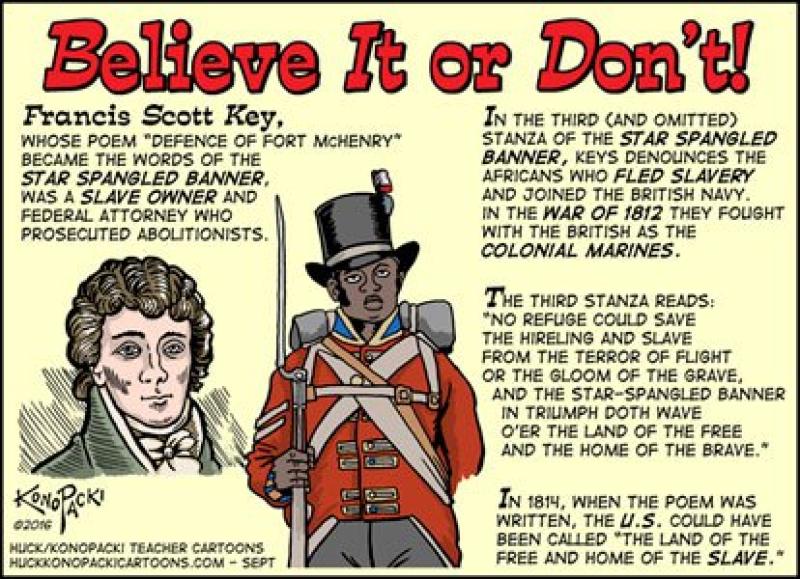Francis Scott Key and the Third Stanza - Believe It Or Don't


https://4.bp.blogspot.com/-xLYiytV8xW4/WGp_Q2Z5rMI/AAAAAAAAmrQ/hCgFuJ4MCiMZDfYhb65zzh8HhEdLBFxuQCLcB/s1600/banner.jpg
-
-
-
Third stanza of the star spangled banner
And where is that band who so vauntingly swore,
That the havoc of war and the battle's confusion
A home and a Country should leave us no more?
Their blood has wash'd out their foul footstep's pollution.
No refuge could save the hireling and slave
From the terror of flight or the gloom of the grave,
And the star-spangled banner in triumph doth wave
O'er the land of the free and the home of the brave.
-
" The Colonial Marines were black slaves that fought with the British in the War of 1812. And you know why they fought for the British? Because the British told them "if we win, you get your freedom". And when people are fighting for their freedom they can be vicious. And the colonial marines were vicious. They knew all the back trails because they had been slaves in the south. They knew where you could cross the rivers, and so they were of great assistance to the British in fighting the Americans. And so they were part of the troop that drove the Americans back into Washington D.C. and set the White House on fire. About three months later, Francis Scott Key, who was part of that group that was driven back to Washington , was now in Baltimore, at Fort McHenry, and he's watching the bombs bursting in air, and getting excited and getting motivated to write the national anthem. And one of the things Francis Scott Key wrote about was , you know these Colonial Marines, they're of concern because "what if all of them did that?" So here is the end of the third verse of our national anthem written by Francis Scott Key
No refuge could save the hireling and slave
From the terror of flight or the gloom of the grave,
And the star-spangled banner in triumph doth wave
O'er the land of the free and the home of the brave.
That is YOUR national anthem. OUR national anthem. And my point is, that from Plymouth Rock white supremacy was the basis of how this country was formed. It doesn't mean we are not a great country, it doesn't mean we are currently all bigots, it means this is the truth about how our country was formed. And we can either deal with it realistically as the truth, or we can keep trying to deny it. And in terms of keep denying the true nature of our history, I feel like just saying, how's that working out for us?"
Jeffery Robinson
The Truth About The Confederacy In The United States
-
related



I am not suggesting that we should change the national anthem, I like the song and it is our most patriotic song and our national anthem, but the fact of history is that Francis Scott Key, for some reason included in the lyrics of that poem a passage that attacks and belittles and wishes death upon people who were fighting for their freedom. Runaway slaves owed no allegiance to the United States, where they had been enslaved. So they joined up with the British and were promised their freedom in exchange for serving in the British military. And Francis Scott Key, a slaveowner, belittles them in his great poem about the battle of Fort Mc Henry.